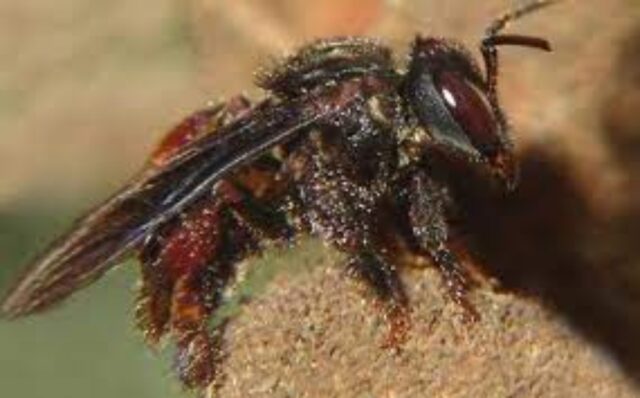‘Vulture bees‘? Costa Rica is home to a species that developed an extra tooth and modified its intestine to eat meat. This is revealed in a study by the University of California (UC) in Riverside, led by entomologist Douglas Yanega, recently released and published by international media.
According to the results, these bees – also called “scavengers” – have unique evolutionary adaptations and modifications. This in an effort to explore other feeding options and not have to compete for pollen and nectar.
The study
The specialists wondered if “vulture bees” have a different gut microbiome than their vegetarian counterparts. To understand this, the scholars traveled to Costa Rica in April 2019 and placed 50-gram bait stations at two sites.
These baits were pieces of fresh raw chicken suspended from branches and smeared with petroleum jelly to avoid the presence of ants. The places chosen were the Las Cruces Biological Station, which is part of the La Amistad Biosphere Reserve. And the other place was the La Selva Biological Station in Puerto Viejo de Sarapiquí. The team noted that the insects used the small baskets on their hind legs to collect pollen and store meat.
“They had little chicken baskets,” said entomologist Quinn McFrederick, also from UC Riverside and who is part of the study. The specialists found that the “vulture bees” have an unusually acid gut and species of microbes linked to the consumption of meat. But, in addition, they have that “tooth” for this function.
Surprise in the research team

“These are the only bees in the world that have evolved to use non-plant food sources. It’s a pretty remarkable change in dietary habits,” Yanega said. Jessica Maccaro, also from UC Riverside and a participant in the research, was surprised by this evolutionary step.
“Unlike humans, whose intestines change with each meal, most species of bees have retained these same bacteria for approximately 80 million years of evolution,” said the entomologist.
“Our findings suggest that the ‘vulture bee’ microbiome has adapted to the new diet through a combination of recruitment of new symbionts, loss of some ancestral microbes and possible adaptation of some ancestral microbes,” adds the study available on the Internet.
Among the bacteria present in the intestine of “vulture bees” is Lactobacillus. It is a type of bacteria that makes lactic acid (a substance made of sugars found in milk and also made by the body). There is also the Carnobacterium bacteria, which is known to be associated with the digestion of meat.
“It’s crazy to me that a bee can eat carcasses,” said Ms. Maccaro. Despite this peculiarity, the scientists found that “vulture bees” still produce honey. But not only that: it is an edible and very sweet honey.
“They store the meat in special chambers that are sealed for two weeks before accessing it, and these chambers are separate from where the honey is stored,” Maccaro explained in the study.


